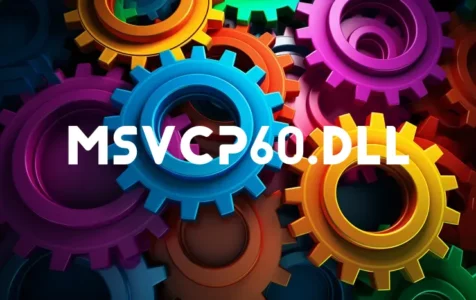The MSVCP60.DLL File: Purpose, Troubleshooting, and Safety
The MSVCP60.dll file is a vital component for users who depend on applications or games that require Microsoft’s C++ libraries to run properly. DLL files, including MSVCP60.dll, are Dynamic Link Libraries – essentially, they contain functions and resources that multiple programs can share, improving system efficiency.
Is MSVCP60.dll Safe?
This file is a legitimate, non-malicious component developed by Microsoft. The official file is safe to run on your computer. Unfortunately, as with any system file, there is potential for a malicious file to be disguised using the same name, causing concern for users who might stumble upon such security threats.
When handling DLL files, especially when downloading them from the internet, it is crucial to verify the source. The original MSVCP60.dll file is typically installed with your Windows operating system or through legitimate application updates and should not be replaced without a compelling reason.
Common Issues with MSVCP60.dll
Users have reported various errors connected to the MSVCP60.dll file, particularly messages indicating that the file is missing, cannot be found, or has been corrupted. Software conflicts or improper application removals can sometimes displace or delete needed DLL files, leading to errors during program execution.
Expert Tip: For smoother PC performance, consider using a PC optimization tool. It handles junk files, incorrect settings, and harmful apps. Make sure it's right for your system, and always check the EULA and Privacy Policy.
Special offer. About Outbyte, uninstall instructions, EULA, Privacy Policy.
Issues with the MSVCP60.dll might manifest as an inability to open certain applications, games crashing, or error notifications during system startups. The file itself sits within the directory “C:\Program Files” or within the system’s “System32” folder, depending on the system architecture.
Fixing MSVCP60.dll Related Errors
Before attempting any fixes, remember to back up your data and set a system restore point. Following best practices ensures that you can roll back changes should the troubleshooting process not go as planned.
Reinstall the File: If the MSVCP60.dll is compromised or missing, obtaining a fresh copy from a safe and reliable source is vital. Make sure you match your system’s architecture, whether it’s 32 or 64-bit, and the appropriate version of the DLL file.
Use the SFC utility: Windows comes with the System File Checker (SFC) tool which can repair missing or corrupted system files.
1. Open Command Prompt with administrative rights.
2. Type the command `sfc /scannow` and hit Enter.
3. Let the process complete and follow the instructions suggested by the SFC utility.
Update the Application: If it’s a specific program causing the error, ensure it is updated to the latest version.
Reinstall the Application: Uninstall and then reinstall the problematic software, especially if it’s the one throwing the error about MSVCP60.dll missing.
Check Computer Management: Ensuring you have administrative rights is also a key troubleshooting step. Navigate via ‘Control Panel’ to ‘Computer Management’ and review your User Group membership to see if administrative rights are in order.
Perform Malware Scan: Use trusted antivirus software to check if the error arises from malware disguised with the file’s name.
Resolving or Preventing Future DLL Issues
To avoid issues with MSVCP60.dll and other system files:
– Keep your operating system and software up-to-date with patches and updates.
– Run antivirus scans regularly to catch and remove malicious files.
– Use only trusted sources when downloading and installing software or system files.
– Do not arbitrarily delete files from system folders as it can cause unexpected problems.
For users discussing their experiences, community forums can be useful. However, caution must be exercised when following advice that involves system files or registry changes. Below are two community discussions related to MSVCP60.dll issues:
1. TechGuy Forum on MSVCP60.dll Missing Export: Link to User Experience – TechGuy
2. Hows.Tech Guide on MSVCP60.dll Download for Windows 11 and 10: Link to User Guide – Hows.Tech
Remember that the DLL files form the skeletal framework of your running applications, thus handle them with care and caution to maintain system stability and function.
